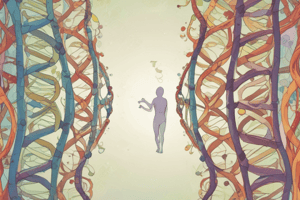Podcast
Questions and Answers
What is a gene?
What is a gene?
A gene is a segment of DNA that provides instructions for making a specific protein or RNA molecule.
How are genes inherited?
How are genes inherited?
Genes are transmitted from parents to their offspring through the process of meiosis, a type of cell division that occurs in the formation of sex cells (sperm and egg).
What is the role of homologous chromosomes in the inheritance of genes?
What is the role of homologous chromosomes in the inheritance of genes?
Homologous chromosomes pair up and exchange genetic material through a process called crossing over during meiosis.
Who is known as the pioneering scientist in Mendelian genetics?
Who is known as the pioneering scientist in Mendelian genetics?
Explain the role of chromosomes in the inheritance of genetic traits.
Explain the role of chromosomes in the inheritance of genetic traits.
What is the role of dominant genes in determining traits in offspring?
What is the role of dominant genes in determining traits in offspring?
What is the function of DNA in the context of Mendelian genetics?
What is the function of DNA in the context of Mendelian genetics?
How many pairs of chromosomes do humans have, and how many chromosomes in total?
How many pairs of chromosomes do humans have, and how many chromosomes in total?
What are the practical applications of Mendelian genetics?
What are the practical applications of Mendelian genetics?
What is the significance of studying the principles of Mendelian genetics?
What is the significance of studying the principles of Mendelian genetics?
Flashcards are hidden until you start studying
Study Notes
Introduction to Inheritance: Mendelian Genetics
Mendelian genetics, named after Gregor Mendel, the pioneering scientist who laid the foundation for the science of genetics, is the study of the inheritance of traits and characteristics from parents to their offspring through the transmission of genes. Mendel's work with pea plants provided the basis for our understanding of how traits are passed down from one generation to the next.
In this article, we will delve into the principles of Mendelian genetics, including what genes are, how they are inherited, and the role of dominant and recessive genes in determining the traits of offspring.
What is a Gene?
A gene is a segment of DNA that provides instructions for making a specific protein or RNA molecule. Genes are passed from parents to their offspring through the process of DNA replication, which occurs during the formation of sperm and egg cells.
How Genes Are Inherited
Genes are transmitted from parents to their offspring through the process of meiosis, a type of cell division that occurs in the formation of sex cells (sperm and egg). During meiosis, homologous chromosomes (chromosomes that carry the same genetic information) pair up and exchange genetic material through a process called crossing over. This process ensures that each sex cell receives a unique combination of genetic material from each parent.
Dominant and Recessive Genes
The traits of offspring are determined by the combination of genes they inherit from their parents. In Mendelian genetics, genes can be classified into two categories: dominant and recessive. A dominant gene is one that will express its trait even if a recessive gene is also present. A recessive gene, on the other hand, will only express its trait if no dominant genes are present.
For example, if an individual inherits a dominant gene for eye color (blue), they will have blue eyes, regardless of whether they also inherit a recessive gene for brown eyes. However, if they inherit two recessive genes for brown eyes, they will have brown eyes.
The Role of Chromosomes in Inheritance
Chromosomes play a crucial role in the inheritance of genetic traits in Mendelian genetics. Each chromosome carries a specific set of genes, and the combination of genes from each parent determines the traits of the offspring. In humans, we have 23 pairs of chromosomes, for a total of 46 chromosomes, and each chromosome carries a unique set of genes.
The Role of DNA in Inheritance
DNA is the molecule that carries the genetic instructions for the development and function of all living organisms. In the context of Mendelian genetics, DNA acts as the carrier of genes that determine the traits of offspring.
Mendelian Genetics in Practice
Mendelian genetics has practical applications in various fields, including medicine, agriculture, and forensics. For example, understanding the inheritance of genetic traits can help in the early detection and prevention of genetic disorders, the development of new medicines and treatments, and the improvement of crop yields through selective breeding.
Conclusion
In conclusion, Mendelian genetics is the foundation of our understanding of the inheritance of traits and characteristics from parents to their offspring. By studying the principles of Mendelian genetics, we can gain insights into the role of genes, chromosomes, and DNA in the determination of traits and the transmission of genetic information from one generation to the next. This knowledge has practical applications in various fields, from medicine to agriculture, and continues to shape our understanding of the complex processes that govern the passing down of traits from one generation to the next.
Studying That Suits You
Use AI to generate personalized quizzes and flashcards to suit your learning preferences.




